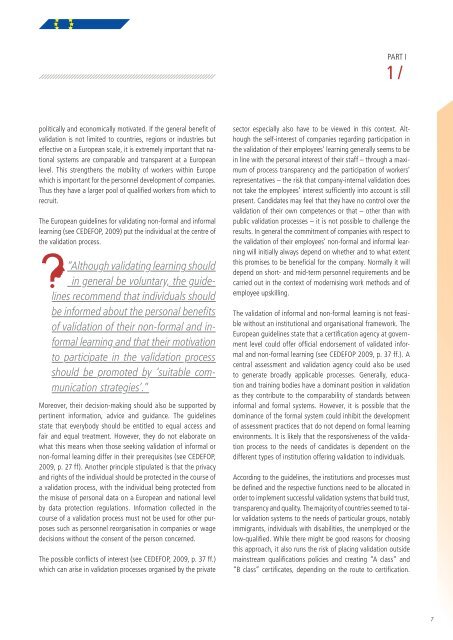RECOGNITION OF NON-FORMAL AND INFORMAL ... - Solidar
RECOGNITION OF NON-FORMAL AND INFORMAL ... - Solidar
RECOGNITION OF NON-FORMAL AND INFORMAL ... - Solidar
Create successful ePaper yourself
Turn your PDF publications into a flip-book with our unique Google optimized e-Paper software.
PART I<br />
1 /<br />
politically and economically motivated. If the general benefi t of<br />
validation is not limited to countries, regions or industries but<br />
effective on a European scale, it is extremely important that national<br />
systems are comparable and transparent at a European<br />
level. This strengthens the mobility of workers within Europe<br />
which is important for the personnel development of companies.<br />
Thus they have a larger pool of qualifi ed workers from which to<br />
recruit.<br />
The European guidelines for validating non-formal and informal<br />
learning (see CEDEFOP, 2009) put the individual at the centre of<br />
the validation process.<br />
“Although validating learning should<br />
in general be voluntary, the guidelines<br />
recommend that individuals should<br />
be informed about the personal benefi ts<br />
of validation of their non-formal and informal<br />
learning and that their motivation<br />
to participate in the validation process<br />
should be promoted by ‘suitable communication<br />
strategies’.”<br />
Moreover, their decision-making should also be supported by<br />
pertinent information, advice and guidance. The guidelines<br />
state that everybody should be entitled to equal access and<br />
fair and equal treatment. However, they do not elaborate on<br />
what this means when those seeking validation of informal or<br />
non-formal learning differ in their prerequisites (see CEDEFOP,<br />
2009, p. 27 ff). Another principle stipulated is that the privacy<br />
and rights of the individual should be protected in the course of<br />
a validation process, with the individual being protected from<br />
the misuse of personal data on a European and national level<br />
by data protection regulations. Information collected in the<br />
course of a validation process must not be used for other purposes<br />
such as personnel reorganisation in companies or wage<br />
decisions without the consent of the person concerned.<br />
The possible confl icts of interest (see CEDEFOP, 2009, p. 37 ff.)<br />
which can arise in validation processes organised by the private<br />
sector especially also have to be viewed in this context. Although<br />
the self-interest of companies regarding participation in<br />
the validation of their employees’ learning generally seems to be<br />
in line with the personal interest of their staff – through a maximum<br />
of process transparency and the participation of workers’<br />
representatives – the risk that company-internal validation does<br />
not take the employees’ interest suffi ciently into account is still<br />
present. Candidates may feel that they have no control over the<br />
validation of their own competences or that – other than with<br />
public validation processes – it is not possible to challenge the<br />
results. In general the commitment of companies with respect to<br />
the validation of their employees’ non-formal and informal learning<br />
will initially always depend on whether and to what extent<br />
this promises to be benefi cial for the company. Normally it will<br />
depend on short- and mid-term personnel requirements and be<br />
carried out in the context of modernising work methods and of<br />
employee upskilling.<br />
The validation of informal and non-formal learning is not feasible<br />
without an institutional and organisational framework. The<br />
European guidelines state that a certifi cation agency at government<br />
level could offer offi cial endorsement of validated informal<br />
and non-formal learning (see CEDEFOP 2009, p. 37 ff.). A<br />
central assessment and validation agency could also be used<br />
to generate broadly applicable processes. Generally, education<br />
and training bodies have a dominant position in validation<br />
as they contribute to the comparability of standards between<br />
informal and formal systems. However, it is possible that the<br />
dominance of the formal system could inhibit the development<br />
of assessment practices that do not depend on formal learning<br />
environments. It is likely that the responsiveness of the validation<br />
process to the needs of candidates is dependent on the<br />
different types of institution offering validation to individuals.<br />
According to the guidelines, the institutions and processes must<br />
be defi ned and the respective functions need to be allocated in<br />
order to implement successful validation systems that build trust,<br />
transparency and quality. The majority of countries seemed to tailor<br />
validation systems to the needs of particular groups, notably<br />
immigrants, individuals with disabilities, the unemployed or the<br />
low-qualifi ed. While there might be good reasons for choosing<br />
this approach, it also runs the risk of placing validation outside<br />
mainstream qualifi cations policies and creating “A class” and<br />
“B class” certifi cates, depending on the route to certifi cation.<br />
7
















